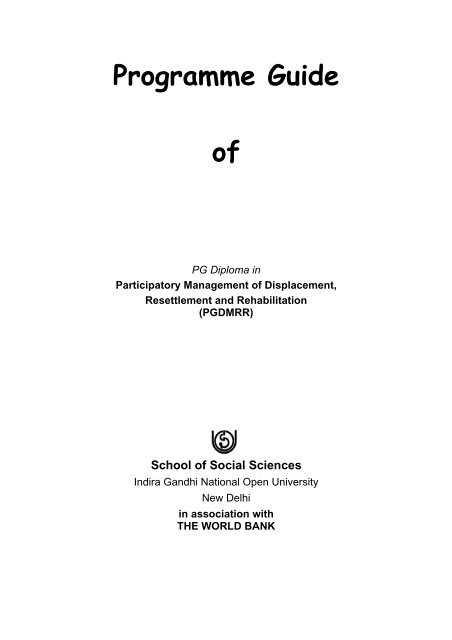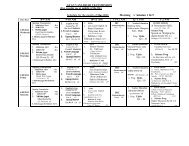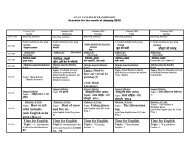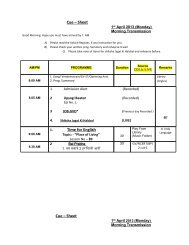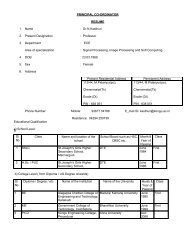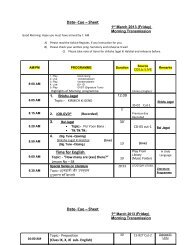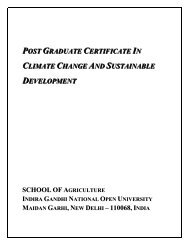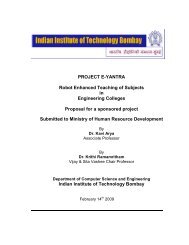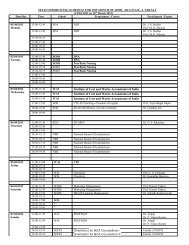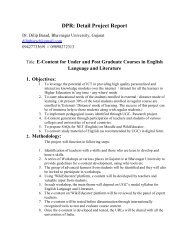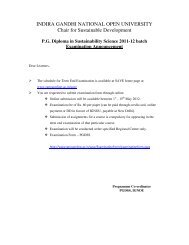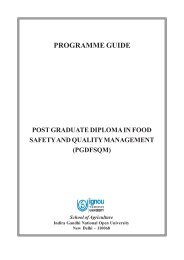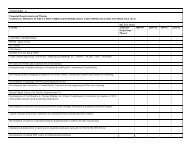Programme Guide - IGNOU Online
Programme Guide - IGNOU Online
Programme Guide - IGNOU Online
Create successful ePaper yourself
Turn your PDF publications into a flip-book with our unique Google optimized e-Paper software.
<strong>Programme</strong> <strong>Guide</strong><br />
of<br />
PG Diploma in<br />
Participatory Management of Displacement,<br />
Resettlement and Rehabilitation<br />
(PGDMRR)<br />
School of Social Sciences<br />
Indira Gandhi National Open University<br />
New Delhi<br />
in association with<br />
THE WORLD BANK
MRR-101<br />
CONTEXT<br />
Displacement<br />
MRR-102<br />
STRATEGY<br />
Participation<br />
MRR-103<br />
INSTITUTION-<br />
ALISATION<br />
R&R of Action<br />
Plan<br />
MRRE<br />
-010<br />
(M&E)<br />
MRRE-007<br />
(EP)<br />
OPTIONAL<br />
COURSES<br />
MRRE-009<br />
(ER)<br />
MRRE<br />
-008<br />
(SCI<br />
P&R)<br />
MRRP-111<br />
APPLICATION<br />
OF<br />
KNOWLEDGE<br />
& SKILLS<br />
MRR-104<br />
IMPLEMENTA-<br />
TION<br />
M&E of R&R<br />
Action Plan<br />
MRR-006<br />
CASE STUDIES<br />
Illustrative R&R<br />
Case Studies from<br />
Different<br />
Development<br />
Sectors<br />
MRR-005<br />
THEORY<br />
Theoretical<br />
Perspectives on<br />
R&R<br />
October, 2007<br />
© Indira Gandhi National Open University, 2007<br />
All rights reserved. No part of this work may be reproduced in any form, by mimeograph of any other<br />
means, without permission in writing from the Indira Gandhi National Open University.<br />
Further information on the Indira Gandhi National Open University courses may be obtained from the<br />
university’s office at Maidan Garhi, New Delhi-110 068. Also visit us at rronline.ignou.ac.in,<br />
www.ignou.ac.in<br />
Printed and published on behalf of the Indira Gandhi National Open University, New<br />
Delhi, by Coordinator, R&R Project, School of Social Sciences.
CONTENTS<br />
1.0 About the University 7<br />
1.1 Objectives of the University 7<br />
1.2 Salient Features of the System 7<br />
1.3 Important Achievements 7<br />
1.4 The Schools of Studies 8<br />
1.5 Academic <strong>Programme</strong>s 8<br />
1.6 Course Preparation 9<br />
1.7 Credit System 9<br />
1.8 Support Services 9<br />
1.9 <strong>Programme</strong> Delivery 9<br />
1.10 Evaluation System 11<br />
2.0 Introduction to the Post Graduate Diploma <strong>Programme</strong> in Participatory 12<br />
Management of Displacement, Resettlement and Rehabilitation<br />
2.1 <strong>Programme</strong> Objectives 12<br />
2.2 Who May Take the <strong>Programme</strong>? 12<br />
2.3 <strong>Programme</strong> Structure 12<br />
2.3.1 Duration of the <strong>Programme</strong> 13<br />
2.3.2 Eligibility 14<br />
2.3.3 Medium of Instruction 14<br />
2.3.4 Availability of Course Material 14<br />
2.3.5 Mode of Availability 14<br />
2.4 How to Register or Enrol /What it Costs 14<br />
3.0 Learning System of PGDMRR 15<br />
3.1 Course Material 15<br />
3.2 Audio- Video Inputs 15<br />
3.3 Feedback 15<br />
3.4 Teleconferencing 16<br />
3.5 E-Counselling / Mentoring 16<br />
4.0 Evaluation System of PGDMRR 17<br />
4.1 Assignments 17<br />
4.2 Term-end Examination 18<br />
4.3 Weightage of Each Component of the Evaluation System 19<br />
4.4 Early declaration of Results 19<br />
4.5 Re-evaluation of Answer Script(s) 19<br />
4.6 Flexibility in Submission of Project Work Report 19<br />
5.0 Other Useful Information 20<br />
6.0 Detailed Syllabus of PGDMRR 23<br />
6.1 Detailed List of PGDMRR Blocks and Units 23<br />
6.2 List of Audio-Video <strong>Programme</strong>s 26<br />
7.0 Appendix 27<br />
7.1 List of <strong>IGNOU</strong> Regional Centres 27<br />
7.2 <strong>Programme</strong> Study Centres 34<br />
7.3 Whom to Contact for What 37<br />
7.4 Some Forms 38
1.0 ABOUT THE UNIVERSITY<br />
Dear Learner,<br />
Welcome to the Post-graduate programme in Participatory Management of displacement,<br />
Resettlement and Rehabilitation. You may like to know about University you have joined. Let<br />
us, therefore begin with an introduction to the Indira Gandhi National Open University<br />
(<strong>IGNOU</strong>).
1.1 Objectives of the University<br />
The Indira Gandhi National Open University was established by an Act of Parliament in 1985<br />
to achieve the following objectives:<br />
‣ democratising higher education by taking it to the doorsteps of the learners<br />
‣ providing access to high quality education to all those who seek it irrespective of age,<br />
region or formal qualifications<br />
‣ offering need-based academic programmes by giving professional and vocational<br />
orientation to the courses<br />
‣ promoting and developing distance education in India<br />
‣ setting and maintaining standards in distance education in the country as an apex<br />
body for the purpose.
1.2 Salient Features of the System<br />
<strong>IGNOU</strong> has certain unique features such as:<br />
‣ national jurisdiction<br />
‣ flexible admission rules<br />
‣ individualized study: flexibility in terms of place, pace and duration of study<br />
‣ use of latest information and communication technologies<br />
‣ nationwide student support services network<br />
‣ cost-effective programmes<br />
‣ modular programmes<br />
‣ resource sharing, collaboration and networking with conventional Universities, Open<br />
Universities and other Institutions/Organisations<br />
‣ socially and academically relevant programmes based on students needs analysis
1.3 Important Achievements<br />
‣ Emergence of <strong>IGNOU</strong> as the largest Open University in the World.<br />
‣ Establishment of Distance Education Council (DEC) for coordination and<br />
determination of standards of Distance Education Systems in the Country (1992).<br />
‣ Recognition as Centre of Excellence in Distance Education by the Commonwealth of<br />
Learning (1993).<br />
‣ Establishment of Staff Training and Research Institute in Distance Education<br />
(STRIDE) with support from the Commonwealth of Learning (COL).<br />
‣ Award of 100 Fellowships by COL as Rajiv Gandhi Fellowships to enable candidates<br />
from 19 countries in the Commonwealth to pursue <strong>IGNOU</strong> <strong>Programme</strong>s.<br />
‣ Launching of an <strong>IGNOU</strong>-ISRO joint channel for organising a one-way video, twoway<br />
audio teleconferencing (1993-94).<br />
‣ Taking <strong>IGNOU</strong> programmes to West Asian countries, Maldives, Mauritius, Nepal<br />
and Seychelles in all to 26 countries.<br />
‣ Award of Excellence for Distance Education Materials by Commonwealth of<br />
Learning (1999).<br />
‣ Launch of a series of 24 hour Educational Channels ‘Gyan Darshan I, II, III and<br />
Kisan Channel’. <strong>IGNOU</strong> is the nodal agency for these channels and regular<br />
transmissions are done from the studios at EMPC, <strong>IGNOU</strong>.<br />
‣ Launch of ‘Edusat’ videoconferencing channel (2 way video, 2 way audio)
1.4 The Schools of Studies<br />
With a view to developing interdisciplinary studies, the University operates through Schools<br />
of Studies. Each School is headed by a Director who arranges to plan, supervise, develop and<br />
organise its academic programmes and courses in coordination with the School staff and the<br />
different academic, administrative and service wings of the University. The emphasis is on<br />
providing a wide choice of courses at different levels. The Schools of Studies currently in<br />
operation are as follows:<br />
‣ School of Computer & Information Sciences (SOCIS)<br />
‣ School of Continuing Education (SOCE)<br />
‣ School of Education (SOE)<br />
‣ School of Engineering & Technology (SOET)<br />
‣ School of Health Sciences (SOHS)<br />
‣ School of Humanities (SOH)<br />
‣ School of Management Studies (SOMS)<br />
‣ School of Sciences (SOS)<br />
‣ School of Social Sciences (SOSS)<br />
‣ School of Agriculture (SOA)<br />
‣ School of Law (SOL)<br />
‣ School of Journalism and New Media Studies<br />
‣ School of Gender and Development Studies<br />
‣ School of Tourism Hospitality Service Sectoral Management<br />
‣ School of Interdisciplinary and Trans-disciplinary Studies<br />
‣ School of Social Work<br />
‣ School of Vocational Education and Training<br />
‣ School of Extension and Development Studies<br />
‣ School of Foreign Languages<br />
‣ School of Translation Studies and Training
1.5 Academic <strong>Programme</strong>s<br />
The University offers a wide range of <strong>Programme</strong>s both short-term and long-term leading to<br />
Certificates, Diplomas, Undergraduate Degrees, Postgraduate Degrees and Doctoral Degrees<br />
which are conventional as well as innovative. Most of these programmes have been developed<br />
after an initial survey of the demand for such <strong>Programme</strong>s. They are launched with a view to<br />
fulfill the learner’s needs for:<br />
‣ certification,<br />
‣ improvement of skills,<br />
‣ acquisition of professional qualifications,<br />
‣ continuing education and professional development at work place,<br />
‣ self-enrichment,<br />
‣ diversification and updation of knowledge.
1.6 Course Preparation<br />
Learning material is specially prepared by teams of experts drawn from different Universities<br />
specialized Institutions in the area all over the country as well as in-house faculty. This<br />
material is scrutinised by the content experts, supervised by the instructors/Unit designers and<br />
edited by the language experts at <strong>IGNOU</strong> before they are finally sent for printing. Similarly,<br />
audio and video cassettes are produced in consultation with the course writers, in-house<br />
faculty and producers. The material is previewed and reviewed by the faculty as well as<br />
outside media experts and edited/modified, wherever necessary, before they are finally<br />
despatched to the Study Centres and Telecast on Gyan Darshan.
1.7 Credit System<br />
The University follows the ‘Credit System’ for most of its programmes. Each credit in our<br />
system is equivalent to 30 hours of student study comprising all learning activities (i.e.<br />
reading and comprehending the print material, listening to audio, watching video, attending<br />
counselling sessions, teleconference and writing assignment responses). Thus, a four credit<br />
course involves 120 hours of study. This helps the learner to know the academic effort one<br />
has to put in, to successfully complete a course. Completion of an academic programme<br />
(Degree, Diploma) requires successful completion of both the assignments and the term-end<br />
examination of each course in a programme.
1.8 Support Services<br />
In order to provide individualised support to its learners, the University has a large number of<br />
Study Centres, <strong>Programme</strong> Study Centres and Work Centres throughout the country. These<br />
are co-ordinated by 33 Regional Centres 6 Sub-Regional Centres and 18 Recognised Regional<br />
Centres as on date. At the Study Centres, the learners interact with the Academic Counsellors<br />
and other learners, refer to books in the Library, watch/listen to video/audio cassettes and<br />
interact with the Coordinator on administrative and academic matters. The list of Regional<br />
and Study Centres is given in this handbook. Support services are also provided through<br />
Work Centres, <strong>Programme</strong> Specific Centres, Skill Development Centres and Special Study<br />
Centres.
1.9 <strong>Programme</strong> Delivery<br />
The methodology of instruction in this University is different from that of the conventional<br />
Universities. The Open University system is more learner-oriented and the learner is an active<br />
participant in the dragogical (teaching and learning) process. Most of the instructions are<br />
imparted through distance education methodology rather than face-to-face communication.<br />
The University follows a multimedia approach for instruction. It comprises:<br />
a) Self Instructional Written Material: The printed study material (written in selfinstructional<br />
style) for both theory and practical components of the programmes is<br />
supplied to the learners in batches of books for every course. A book usually comprises 3<br />
to 5 Blocks, which inturn, comprise 3 to 5 units.<br />
b) Audio-Visual Material Aids: The learning package contains audio and video cassettes<br />
which have been produced by the University for better clarification and enhancement of<br />
understanding of the course material given to the learner. A video programme is normally<br />
of 25-30 minutes duration. The audio tapes are run and video cassettes are screened at the<br />
study centres during specific sessions which are duly notified for the benefit of the<br />
learners. The video programmes are telecast on National Network of Doordarshan and<br />
Gyan Darshan. Some of the selected stations of All India Radio are also broadcasting the<br />
audio programmes. Learners can confirm the dates for the programme from their study<br />
centres. The information is also provided through the National Newspapers and <strong>IGNOU</strong><br />
Newsletters sent to the learners periodically.<br />
c) Counselling Sessions: Normally counselling sessions are held as per schedule drawn by<br />
the Study Centres. These are mostly held during the non-working hours of the host<br />
institutions where the study centres are located.<br />
d) Teleconferences: Live sessions are conducted via satellite through interactive Gyan<br />
Darshan Channel from the University studios at EMPC, the schedule of which is made<br />
available at the study centres. The learner will have to go to the nearest centre at the<br />
scheduled time for taking benefit of this facility.<br />
e) Practicals/Project Work: Some <strong>Programme</strong>s have practical/project components also.<br />
Practicals are held at designated institutions for which schedule is provided by the Study<br />
Centres. Attendance at practicals is compulsory. Keeping in tune with the flexibility as<br />
regards choice of time for study one way is to skip practicals during a year but for doing it<br />
in a subsequent year or in order to have a repeat exercise, additional fee determined by the<br />
University has to be paid. For project work, study centres will provide the necessary<br />
guidance but the learner will have to manage his/her own resources.<br />
f) Gyan Darshan Educational Channel: A collaboration between MHRD, Prasar Bharti,<br />
<strong>IGNOU</strong> and other organisations has resulted in launching DD Gyan Darshan, the<br />
Educational Channel of India. In a significant gesture, EMPC has been identified as the<br />
coordinating and transmitting agency. Regular transmission of educational programmes<br />
from the EMPC studios started on January 10, 2000. The Channel is providing<br />
educational programme on a variety of subjects for 24 hours a day to enhance the learning<br />
process. Steps are being taken to relay the Gyan Darshan Channel through different Cable<br />
Operators in the Country for wider outreach. GD signals can be conveniently received<br />
without any special equipment anywhere. Gyan Darshan has now gone completely digital<br />
and expanded into a bouquet of channels namely GD-1,GD-2 and GD-3 ‘Eklavya’.<br />
Educational programmes are contributed by major educational institutions such as<br />
<strong>IGNOU</strong>, UGC/CEC, NCERT/CIET, Directorate of Adult Education, IITs and other<br />
educational/development organizations in the country. Gyan Darshan transmissions<br />
uplinked from the earth station of EMPC-<strong>IGNOU</strong>, New Delhi can be accessed all over the<br />
country throughout the year and round the clock without any break.
g) Gyan Vani: <strong>IGNOU</strong> has been offered FM Channel Radios in 40 cities and towns for<br />
education and development. EMPC is the nodal agency for implementing the project.<br />
EMPC is also studying an experimental proposal for global Gyan Vani. As many as 17<br />
FM Radio Stations at Allahabad, Bangalore, Coimbatore, Vishakhapatnam, Mumbai,<br />
Lucknow, Bhopal, Kolkata, Chennai and Delhi are already on air. The broadcasts in<br />
English, Hindi and the regional languages/dialects are conducted by local resource<br />
persons. The detailed schedule can be accessed at <strong>IGNOU</strong> EMPC-Gyandarshan Website<br />
http://www.ignou.ac.in/gyandarshan%scindex.html.<br />
h) Interactive Radio-Counselling: Interactive Radio-Counselling is a recent concept in<br />
distance learning in India. Live counselling is provided on radio by invited experts.<br />
Students can ask questions right from their homes on telephone. These sessions are<br />
conducted for an hour on Sundays from 189 radio stations in the country. A toll free<br />
telephone number 1600 112345 has been provided for this purpose from selected cities.<br />
i) Interactive Website: University is also offering some of the programmes through ignou<br />
website http://www.ignou.ac.in . you can check the site from time to time to check for<br />
these programmes.
1.10 Evaluation System<br />
<strong>IGNOU</strong> has a three-tier system of evaluation. Which is, a) Self-assessment exercises within<br />
each Unit of study; b) Continuous evaluation mainly through assignments which is tutormarked<br />
and c) The term-end examinations and project work.<br />
The evaluation of learners depends upon various instructional activities undertaken by them.<br />
A learner has to write assignment responses compulsorily before taking term-end examination<br />
from time to time to complete an academic programme. <strong>IGNOU</strong> uses tutor-marked<br />
assignment (TMA). Evaluation of assignments is called continuous assessment (CA). A<br />
learner has to send tutor marked assignment (TMA) response to the concerned Coordinator of<br />
the Study Centre to which s/he is attached. The marks weightage given to assignments,<br />
seminars/ practicals varies from 25% to 50% of the maximum possible score.<br />
Besides CA, a learner has to sit for term-end examinations (TEEs) (carrying 50% to 75%<br />
weightage) conducted at various examination centres spread all over the country and abroad<br />
in June and December. <strong>IGNOU</strong> uses the system of “Grading” for evaluating learners’<br />
achievement (assignment responses, project work, etc.) on a five-point scale using letter grade<br />
A, B, C, D, E. The notional correlates of the letter grades are as follows:<br />
Letter Grade Qualitative Level Point Grade<br />
Division Percentage Range Grade 5-Point Scale<br />
I<br />
80 and above<br />
60 to 79.9<br />
A- Excellent<br />
B- Very Good<br />
5<br />
4<br />
II 50 to 59.9 C- Good 3<br />
Pass 40 to 49.9 D- Satisfactory 2<br />
Unsuccessful Below 40 E- Unsatisfactory 1
2.0 INTRODUCTION TO THE POST GRADUATE<br />
DIPLOMA PROGRAMME IN PARTICIPATORY<br />
MANAGEMENT OF DISPLACEMENT,<br />
RESETTLEMENT AND<br />
REHABILITATION<br />
The post-graduate certificate programme in Participatory Management of Displacement,<br />
Resettlement and Rehabilitation is a proactive initiative of the World Bank and Indira Gandhi<br />
National Open University. Its aim is to build the skills of Resettlement and Rehabilitation<br />
Officers, Field Staff, Desk Staff and Technical Experts (civil, mechanical and electrical<br />
engineers, architects, agriculture experts other services providers) in participatory methods of<br />
managing the concerns and issues of displacement and working for satisfactory resettlement<br />
and rehabilitation of those by development projects.
2.1 <strong>Programme</strong> Objectives<br />
The objectives of the programme are to orient learners to<br />
‣ Contextualize development caused displacement and rehabilitation<br />
‣ Strategize participatory planning of resettlement and rehabilitation<br />
‣ Appreciate the participatory implementation and monitoring of resettlement and<br />
rehabilitation<br />
‣ understand theoretical perspectives in the study of R&R<br />
‣ learn lessons from already executed development projects<br />
‣ imbibe specialized knowledge on different phases of R&R process<br />
‣ prepare an individual field work based Project work report that integrates the learning<br />
with specific activities of processes in a development project.
2.3 <strong>Programme</strong> Structure<br />
The post-graduate Diploma in Participatory Management of Displacement,<br />
Resettlement and Rehabilitation (PGDMRR) is a multi-media learning package,<br />
which consists of a total of 32 credits with eight courses. However it offers total 11<br />
courses. The programme also hasa multimedia components, which are listed in Table<br />
2. These courses are listed below:<br />
Course Code Title of the Course Credits<br />
MRR-101 Understanding Development-Caused Displacement 4<br />
MRR-102 Role of Participation in Sustainable Development 4<br />
MRR-103 Participatory Planning of Resettlement and 4<br />
Rehabilitation<br />
MRR-104 Participatory Implementation and Monitoring of 4<br />
Resettlement and Rehabilitation<br />
MRR-005 Theoretical Perspectives on R&R 4<br />
MRR-006 Illustrative R&R Case Studies from Different 4<br />
Development Sectors<br />
MRRE-007 * Economic Planning of R&R and Implementation 4<br />
MRRE-008 * Socio-Cultural and Infrastructural Planning and 4<br />
Relocation<br />
MRRE-009 * Economic Rehabilitation of PAPs 4<br />
MRRE-010 * Monitoring and Evaluation of R&R 4<br />
MRRP-111 Project Work to be completed by the learners 4<br />
Note: * refers to optional courses. The learner is expected to specialise in one of the themes by opting for one of<br />
the four courses. All the other courses are compulsory.<br />
Table 2: Multimedia Components of the <strong>Programme</strong><br />
Sl.<br />
No Media<br />
Description Any other details Duration<br />
1 Audio Programs Eight programs related to the<br />
courses<br />
Available in CD-Rom<br />
and on Gyan Vani<br />
Each audio is of<br />
20 to 30 minutes<br />
2 Video Programs Available in CD-Rom and on<br />
Gyan Vani<br />
3 Teleconference<br />
through Gyan<br />
Darshan, for one<br />
hour for each of the<br />
8 Courses<br />
Panel discussions and response to<br />
viewers questions on<br />
i) Displacement,<br />
ii) Participation<br />
iii) Participatory Planning,<br />
iv) Participatory<br />
Implementation and<br />
Monitoring of R&R<br />
v) Case Studies from Different<br />
vi)<br />
Development Sectors<br />
Socio-cultural Planning and<br />
Implementation<br />
vii) Economic Planning of R&R<br />
viii) Economic Rehabilitation<br />
Available in CD-Rom<br />
and on Gyan Darshan<br />
If required, more such<br />
sessions may be<br />
organized by the<br />
learners at concerned<br />
study centres on a<br />
limited scale E-<br />
counselling will be<br />
through chat session<br />
Each video is of<br />
25 to 30 minutes<br />
Each of the four<br />
sessions will be of<br />
one hour. In the<br />
case of nonavailability<br />
of teleconferencing,<br />
chat<br />
session will take<br />
place through the<br />
Internet.
4 Internet will be used<br />
for the purpose of e-<br />
counselling and<br />
TMAs Both<br />
activities are part of<br />
continuous<br />
assessment in the<br />
program<br />
i) For announcement on e-<br />
counselling you will have to<br />
check the site<br />
http://rronline.ignou.ac.in<br />
continuously.<br />
ii) TMAs will also be available<br />
on <strong>IGNOU</strong> website as well<br />
as programme website.<br />
i) One e-<br />
counselling sessions<br />
will be conducted for<br />
each course.<br />
ii) TMAs will<br />
be submitted at<br />
the concerned<br />
study centres.<br />
iii) TMAs can also<br />
be submitted<br />
online on the site.<br />
For e-counselling<br />
Internet time<br />
required will be of<br />
1-hour duration for<br />
each session.
2.3.1 Duration of the <strong>Programme</strong><br />
Minimum 1 year Maximum 4 years<br />
The India Gandhi National Open University (<strong>IGNOU</strong>) offers reasonably flexible duration for<br />
completing its programmes. If you plan your study-schedule in a systematic manner, you will<br />
be able to finish your courses within the stipulated time limit. The following information will<br />
help you decide the time-schedule for the PG Diploma in Participatory Management of<br />
Displacement, Resettlement and Rehabilitation.<br />
The PG Diploma in Participatory Management of Displacement, Resettlement and<br />
Rehabilitation is a one year programme for which you will receive the entire study material in<br />
one lot. You can, however, take a maximum of 4 years to complete the programme, if you<br />
wish so. For completing the programme in time, you must submit your assignments and<br />
submit your project work report.<br />
You need to remember that in the online mode of programme delivery, there is no flexibility<br />
available for completion of online assignments. You will need to complete all your<br />
assignments within a period of one year only. You will, however, be able to submit your<br />
Project Work Report anything within the four years from the date of your registration. In case,<br />
you cannot complete your assignments in the first cycle of one year, you will need to get a<br />
fresh set of assignments for the next year. Therefore, we advise you to take care to complete<br />
your assignments and take more time, if required, to submit the Project Work Report. You<br />
will not be able to submit your Project Work Report if you have not completed and submitted<br />
all your assignments.
2.3.2 Eligibility<br />
B.A or its equivalent and access to computer and the Internet, with basic competence in their<br />
uses.
2.3.3 Medium of Instruction<br />
The PG Diploma in Participatory Management of Displacement, Resettlement and<br />
Rehabilitation is offered by <strong>IGNOU</strong> through the medium of English only.
2.3.4 Availability of Course Material<br />
The course material will be available through print mode initially from January 2008 followed<br />
by its availability online for the learners who have registered for online mode of the<br />
programme from January 2009. Each year the program will be offered in January and July<br />
sessions. However in total, in will have one year cycle, running from January to December for<br />
January session and July to June for July session. You will receive online the entire study<br />
material for all the courses in one lot. This means that the programme will be available in the<br />
online mode as well as print mode. Learners will not however be able to switch from one<br />
mode to another. At the time of admission the learner will need to clearly state the option of<br />
one mode only.
2.3.5 Mode of Availability<br />
The program will run through the Internet mode. You will have all inputs of the program<br />
available online in a website. All registered learners can access this website. You can access<br />
Prospectus For PGDMRR along with the admission form at www.ignou.ac.in and at<br />
rronline.ignou.ac.in between September and November of each year. This <strong>Programme</strong> <strong>Guide</strong><br />
is also available at rronline.ignou.ac.in as an alternative to online text of course material. You<br />
can use them in the stand-alone mode in your computer or through computer facilities at the<br />
Study Centre allotted to you. Which you will have to compulsorily use for chat sessions, e-<br />
mail and for pasting and downloading your discussion forum notes. If you have better access<br />
to the Internet, you may decide to be online for all components of learning in this program.
2.4 How to Register or Enrol /What it Costs<br />
To register or enrol, you will have to submit a duly completed application from, available in<br />
the Handbook which you can access online or acquire its printed copy from the address of the<br />
university and its regional and study centres. The addresses are given in the advertisement for<br />
admission to the program in newspapers. You must register along with the Demand Draft,<br />
drawn in the name of <strong>IGNOU</strong> and payable at New Delhi. Those submitting their applications<br />
and Demand Drafts at Regional Centres need to make the Demand Draft payable at the city of<br />
the Regional Centre. Please write your name (in capital letters) and <strong>Programme</strong> Code<br />
(PGDMRR) on the back of the Demand Draft to ensure Proper credit to your fee account.<br />
The fee structure (including the examination fee) for Post Graduate Diploma <strong>Programme</strong> in<br />
Participatory Management of Displacement, Resettlement and Rehabilitation (PGDMRR) is<br />
as follows.<br />
Rs. 6100/- to be paid along with the submission of admission form. This includes a<br />
Registration fee of Rs. 100/-.
3.0 LEARNING SYSTEM OF PGDMRR<br />
The methodology of instruction in <strong>IGNOU</strong> is learner-oriented and the student is an active<br />
participant in the learning process. Most of the learning takes place through distance<br />
communication and you will also have the advantage of communication with the course<br />
counsellors/ mentors through counselling/chat sessions, e-mail and assignments.
3.1 Course Material<br />
Self-learning course material available through print material followed by online mode of<br />
delivery is the primary form of instructional material. In addition, there are a number of<br />
audio-video programmes and interactive sessions (chat, e-mail and assignment). You are<br />
welcome to spend as much time as you are able to concentrate on the self-learning course<br />
material that is available in the printed books/online.<br />
The self-learning course material prepared by the course preparation team is self instructional<br />
in nature. Each course has an introduction that explains its main theme. Each course theme<br />
has been divided into sub-themes, which are identified by block titles. Each block consists of<br />
sub sub-themes or a number of Units/lessons. Normally, all the Units covered in one block<br />
have a thematic unity. The first page of each block gives a brief introduction to the block,<br />
explaining the total coverage of the block as a whole. The block introduction also provides a<br />
brief on the coverage of each Unit in the block.<br />
Each Unit is structured to facilitate self-study for you. Its concept map or structure is divided<br />
into several sections. The section on Objective briefly states what we expect you to attain<br />
when you complete the Unit or what are the learning points in the lesson/Unit. In<br />
Introduction, there is an attempt to link the subject matter of the previous Units to the<br />
present Unit. This follows the main body of the Unit, which is divided into various sections<br />
and sub-sections. There are a few self-check exercises, spread in between sections and subsections<br />
under the caption Check Your Progress.<br />
Besides the Units in the six compulsory and four optional courses (out of four optional<br />
courses, you are expected to complete one only), you have another compulsory course<br />
(MRRP-111), which requires you to select a topic for your project, dealing with the practical<br />
aspects or the subject matter covered in the earlier courses. This is to provide you an<br />
opportunity to apply your learning to concrete field situations and find out what you can<br />
attempt to do at your end. You are going to be your own teacher when you are applying<br />
certain ideas to the field situation. The more you attempt to carry out experiments on your<br />
own the more you will reach nearer the goals this programme of study has set out to achieve.
3.2 Audio- Video Inputs<br />
In addition to the printed and online text of the Units in the courses, audio-video programmes<br />
are also available for the programme. Some of you may learn better through ears and eyes and<br />
we welcome you to make use of these aids available in the CD-ROM. Some may say that<br />
seeing is believing, so do view the video programmes, which have been produced at the<br />
Electronic Media Production Centre (EMPC) or acquired from different sources for your use.<br />
The <strong>IGNOU</strong> video programmes are also transmitted by Gyan Darshan channel of<br />
Doordarshan. The Electronic Media Production Centre (EMPC), <strong>IGNOU</strong>, sends a monthly<br />
schedule to all Regional and Study Centres of <strong>IGNOU</strong>. The University Newsletter also gives<br />
the transmission schedule. The newsletter goes to every student three times a year.<br />
At present, the PG Diploma in Participatory Management of Displacement, Resettlement and<br />
Rehabilitation has 8 audio programmes and 4 video programmes. We will add more audiovisual<br />
aids as the learners will in due course provide their project reports, leading to further<br />
learning points. In case learners submit their Project Work Reports in audio/video or another<br />
format, the same, if found relevant and appropriate, will be added to the course material.
3.3 Feedback<br />
At the end of each book, you will find one section on Learning Outcomes for each block.<br />
You, the learner, will complete it after reading the Units in that block to elaborate what you<br />
have been able to derive from the course content of the block. You need to answer each<br />
question. Your answers will help the faculty, in-charge of preparing the course-material. This<br />
will help us to incorporate changes according to your responses to the course-material and<br />
audio-video programmes. You may also send your feedback to PGDMRR Coordinator.
3.4 Teleconferencing<br />
To reach our students spread in different parts of the country, we take help of<br />
teleconferencing mode of learning. These sessions are conducted from Delhi and the students<br />
can attend them at most regional and some study centres of <strong>IGNOU</strong>. Teleconferencing is a<br />
one-way video / two way audio facility. You will get a schedule with topics in advance<br />
through the online notice board. The faculty and other experts as resource persons participate<br />
in these sessions. Your participation will also figure in ‘learner to learner education’ sessions.<br />
These sessions will be recorded for use as video programmes, for those who are unable to<br />
attend the teleconferencing sessions.
3.5 E-Counselling / Mentoring<br />
In open and distance education, virtual synchronous/asynchronous contact between the<br />
learners and their mentors through chat session, and e-mail is an important activity. In the PG<br />
Diploma in Participatory Management of Displacement, Resettlement and Rehabilitation the<br />
purpose of such a contact is manifold. The mentor will try to answer your questions and<br />
clarify your doubts, which may not be possible or take inordinately long time, through other<br />
means of communication. At this time you will also get a chance to communicate with some<br />
of other means of communication. At this time you will also get a chance to communicate<br />
with some of other fellow learners of this programme. We urge you to make most of this<br />
opportunity by sharing your experiences with the fellow learners and benefit from their<br />
experiences.<br />
You need to read regularly the Announcement Section of your programme website<br />
http://rronline.ignou.ac.in for detail of schedules of chat sessions, assignment submission<br />
dates, and other relevant information.<br />
The mentors will hold the chat sessions for each of the courses at suitable intervals throughout<br />
the entire academic session. The chat sessions are not compulsory for you to attend. These<br />
sessions may, however, be very useful in certain respects. For example, you may share your<br />
views and experiences with the mentor as well as fellow learners, comprehend better some of<br />
the complex ideas and processes, discussed in the course material, get clarification of your<br />
queries, and ask questions about your project work.<br />
Please note that chat sessions are very different from the usual classroom teaching or lectures.<br />
Mentors are expected to help you to overcome difficulties, which you may face during the<br />
course of study. (The mentors may also supervise your project work. For seeking supervision<br />
you are advised to write and send your questions to your mentor by e-mail. You are advised<br />
to use e-mail facility to send your questions and your questions to your mentor by e-mail.<br />
Please read Project-Work <strong>Guide</strong> for details on this matter.)<br />
Before you attend the chat sessions, please go through your course material and note down the<br />
points to be discussed. Unless you go through the Units, there may not be much to discuss.<br />
Try to concentrate on the relevant and the most important issues. Also try to understand each<br />
other’s point of view. You may also establish personal contact with your fellow participants<br />
to get mutual help in academic work. Try to get the maximum help from your mentors.<br />
Over the period of one year there will be counselling or mentoring of a total of 10 hours,<br />
including the supervision of project work. You will need access the Internet to avail the<br />
facility of mentoring and supervision. We advise you to visit the nearest cyber café for<br />
this purpose. Those who do not have easily available facility of cyber café near to their<br />
place of residence or work may write to us for a CD-ROM that will provide at a minimal<br />
cost the limited facility of the use of Internet for 10 hours over the period of your study<br />
i.e. one year. The Announcement page in your programme website<br />
http://rronline.ignou.ac.in will inform you about the detailed schedule of chat sessions and<br />
other necessary information.
4.0 EVALUATION SYSTEM OF PGDMRR<br />
The evaluation consists of two parts: 1) continuous evaluation through assignments, and 2)<br />
term-end examination. In the final result all the assignments carry 50 per cent weight age<br />
while 50 per cent weight age is for the term-end examination. The following is the scheme of<br />
awarding divisions and grades:<br />
Division Percentage Range Grade Five Point Grade<br />
I<br />
80 and above A-Excellent 5<br />
60 to 79.9 B-very Good 4<br />
II 50 to 59.9 C-Good 3<br />
Pass 40 to 49.9 D-Satisfactory 2<br />
Unsuccessful Below40 E-Unsatisfactory 1<br />
<strong>IGNOU</strong> requires you to score at least 40 per cent marks both in continuous evaluation<br />
(assignment) as well as the term-end examination separately. You need to get at least 40 per<br />
cent marks in assignments put together as well as in the term-end examination to get the<br />
award of the PG Diploma in Participatory Management of Displacement, Resettlement and<br />
Rehabilitation.
4.1 Assignments<br />
Assignments constitute the continuous evaluation. The submission of assignments is<br />
compulsory. The marks that you get in your assignments will count in your final result.<br />
Assignments of a course carry equal weight age with the term-end examination. Therefore,<br />
you are advised to take your assignments seriously. A simple omission on your part may<br />
cause loss to you and inconvenience at all levels in the University.<br />
The main purpose of assignment is to test your comprehension of the learning materials and<br />
also to help you get through the courses. You will have the benefit of learning from the<br />
comments of the evaluators. The comments guide you in your study and help in improving it.<br />
The content provided in the course materials should be sufficient for answering the<br />
assignments. Please do not worry about the non-availability of extra reading materials for<br />
working on the assignments. However, if you have an easy access to other books, you may<br />
make use of them. The assignments are designed in such a way as to help you concentrate<br />
mainly on the course materials and exploit your personal experience. The PG Diploma in<br />
Participatory Management of Displacement, Resettlement and Rehabilitation has Tutor<br />
Marked Assignments as a component of continuous assessment and Project Work.<br />
Tutor Marked Assignment: These assignments will be sent to you with the course material<br />
by the University. You will have to attempt the answers to the questions given in the<br />
assignments as per the instructions given there. Submit your assignments before taking up the<br />
final exams for the courses. If you are not able to submit within a period of one year, you will<br />
have to ask for a new set of assignments for that particular year and attempt those<br />
assignments.<br />
Project Work: Your understanding of the course-material, provided in the Units of the<br />
courses and audio-video programmes will culminate in your completing the assignments and<br />
submitting the Project Work Report, which is an opportunity for you to utilise your<br />
knowledge, sensitivity and skills gained during the course of studying the various Units of the<br />
programme.<br />
Like assignments, the top ten Project Work Reports among those submitted during the<br />
term-end examination will also be made a part of the course material during its next<br />
revision. In this way, we hope to have you as a course writer too. This is a unique feature<br />
of the PG Diploma in Participatory Management of Displacement, Resettlement and<br />
Rehabilitation.<br />
You may be a little apprehensive about the nature of Project Work Report you will submit.<br />
Please read carefully all sections of the Project-Work <strong>Guide</strong>, specifically prepared for the<br />
purpose of providing frequently asked question in respect of Project Work Report. In addition<br />
do not hesitate to seek help from your mentor.
4.2 Term-end Examination<br />
The University conducts Term-end Examination twice a year in the month of June and<br />
December every year. Students will be permitted to appear in term-end examination subject to<br />
the conditions that registration for the courses in which they wish to appear is valid.<br />
Maximum time to pursue the programme is not elapsed and they have also submitted the<br />
required number of assignment(s), if any, in those courses by the due date.
Examination Fee<br />
Examination fee of Rs. 50/- per course is required to be paid through Bank Draft in favour of<br />
<strong>IGNOU</strong> payable at Delhi. The examination forms are available at all the Study Centres and<br />
Regional Centres. Students can also submit on-line examination form as per guidelines<br />
through <strong>IGNOU</strong> website at www.ignou.ac.in
Examination Centre<br />
Normally the study center is the examination center. However, a student is required to fill the<br />
exam center code in the examination form. For the purpose you are advised to go through the<br />
list of study center available in the Student Handbook and Prospectus/<strong>Programme</strong> <strong>Guide</strong>. In<br />
case any student wish to take examination at a particular center, the code of the chosen center<br />
be filled up as examination center code. However, examination center chosen by a student if<br />
is not activated, the university will allot another examination center under the same Region.<br />
Date of Submission of Examination Forms<br />
To avoid discrepancies in filling up examination form/hardship in appearing in the term-end<br />
examination, they are advised to:<br />
i) remain in touch with your Study Centre/Regional Centre/SRE Division for change in<br />
schedule of submission of examination form/fee, if any;<br />
ii) fill up the examination form for next term-end examination without waiting for the result<br />
of the previous term-end examination and also filling up the courses, for which result is<br />
awaited;<br />
iii) fill up all the particulars carefully and properly in the examination form to avoid<br />
rejection/delay in processing of the form;<br />
iv) retain proof of mailing/submission of examination form till you receive examination hall<br />
ticket;
Issue of Examination Hall Ticket<br />
University issues Examination Hall Ticket to the students atleast two week before the<br />
commencement of Term-end Examination the same could also be downloaded from the<br />
University’s website www.ignou.ac.in. In case any student fails to received the Examination<br />
Hall Ticket within one week before the commencement of the examination the students can<br />
download the hall ticket from the website and approach the exam center for appearing in the<br />
exam.
4.3 Weightage of Each Component of the Evaluation<br />
System<br />
The combined weightage of the assignments is 50 per cent.<br />
Weightage<br />
TMAs 50%<br />
Term-end Examinations 50%<br />
Projec t Work Report 100%<br />
The Project Work will be distributed into<br />
Clarity of topic, language, coherence, style etc 20%<br />
Clarity of objectives, methodology and methods 20%<br />
Understanding and application of participatory approach and 40%<br />
Extent to which learning points of each of the four courses reflect in<br />
the body of the Project-Work Report.<br />
20%
4.4 Early Declaration of Results<br />
In order to facilitate the students who have got offer of admission and/or selected for<br />
employment etc. and are required to produce marks-sheet/grade card by a specified given date<br />
may apply for early process of their answer scripts and declaration of the results for this<br />
purpose. The students are required to apply in the specified format available on the University<br />
website with a fee of Rs. 500/- per course through Bank Draft drawn in favour of <strong>IGNOU</strong><br />
alongwith the attested photocopy of the offer of admission/ employment offer. The students<br />
can submit their requests for early declaration before the commencement of the Term-end<br />
Examination i.e., before 1 st June and 1 st December respectively. The University in such cases<br />
will make arrangements for processing the answer scripts and declare the results as a special<br />
case possibly in a month time from date of examination.
4.5 Re-evaluation of Answer Script(s)<br />
The students who are not satisfied with the marks/grade secured by them in Term-end<br />
Examination can apply for re-evaluation within one month from the date of declaration i.e. the<br />
date on which the result are made available on the University website on payment of Rs. 300/-<br />
per course in the prescribed application from available on the University website. The better<br />
of the two courses or original marks/grades and re-evaluated marks/grades shall be<br />
incorporated in the student’s records as applicable and the revised grade card/marks sheet will<br />
be sent to the students within one month from the receipt of application. Re-evaluation is not<br />
permissible for Projects, practicals, Assignments and Seminars etc.
4.6 Flexibility is Submission or Project Work Report<br />
The learner may however submit the Project Work Report within a total span of four years<br />
from the date of his/her registration to the programme.<br />
The last date for submission of Project Reports are as follows:<br />
For December term-end exam 31 st November and for June term-end exam 31 st March
Re-Submission of Project Report<br />
If a students re-submit a project report due to not securing of minimum marks and on other<br />
grounds; apro-rata fee is to be enclosed in the form of Demand Draft at the time of resubmission.
5.0 OTHER USEFUL INFORMATION AND UNIVERSITY<br />
RULES<br />
The University reserves the right to change the rules from time to time. However, latest<br />
rules will be applicable to all the students irrespective of year of registration.
Provisional Admission<br />
The students who are appearing in qualifying examination can also apply for different<br />
programmes of the University. Candidate seeking Provisional Admission will be required to<br />
give a separate application in the prescribed Performa to be obtained by him/her from the<br />
Regional Centre and submit it along with duly completed admission application form and fee.<br />
However, such students will be required to submit the proof of having passed the qualifying<br />
examination latest by 30th March, 2008 positively at the concerned Regional Centre failing<br />
which his/her admission will stand cancelled. The fee once paid will not be refunded even if<br />
the student fails to produce the required document(s) or not found otherwise eligible for<br />
admission to that programme.
Educational Qualifications Awarded By Private<br />
Institutions<br />
Any educational qualification awarded by the Private Universities established under the<br />
provisions of the “Chhattisgarh Niji Kshetra Vishwavidylaya (Sathapana Aur Viniyaman),<br />
Adhiniyam, 2002” are non- existent and cannot be made the basis of admission to higher<br />
studies with <strong>IGNOU</strong>.
Incomplete and Late Applications<br />
Incomplete application forms/Re-registration forms, received after due date or having wrong<br />
options of courses or electives or false information, will be summarily rejected without any<br />
intimation to the learners. The learners are, therefore, advised to fill the relevant columns<br />
carefully and enclose the copies of all the required certificates duly attested by a Gazetted<br />
Officer. The form is to be submitted to the Regional Director concerned ONLY on or<br />
before the due date. The application form sent to other offices of the University will not be<br />
considered and the applicant will have no claim whatsoever on account of this.
Validity of Admission<br />
Learners offered admission have to join on or before the due dates specified by the<br />
University. In case they want to seek admission for the next session, they have to apply afresh<br />
and go through the admission process again.
Simultaneous Registration<br />
Students who are already enrolled in a programme of one year or longer duration can also<br />
simultaneously register themselves for any certificate programme of 6 months duration.<br />
However, if there is any clash of dates of counselling or examination schedule of the two<br />
programmes taken, University will not be in a position to make adjustment.
Re-admission<br />
The students who are not able to clear their programme within the maximum duration allowed<br />
can take readmission for additional 1 year in continuation of the earlier duration in this<br />
programmes. The student has to make payment per course on pro-rata basis. The details of<br />
pro-rata fee and the Re-admission Form are available at the Regional Centres for the courses<br />
which they have not been able to complete. For further details please see the website.<br />
The student; who fail to pay the prescribed full programme fee during the maximum duration<br />
of the <strong>Programme</strong> will have to pay full fee for the missed years in addition to pro-rata course<br />
fee for readmission.
Scholarships and Reimbursement of Fee<br />
Reserved Categories, viz. Scheduled Castes, Scheduled Tribes and Physically Handicapped<br />
learners are to pay full fee at the time of admission to the University along with other general<br />
category candidates. SC/ST learners have to collect and subsequently submit their scholarship<br />
forms to the respective State’s Directorate of Social Welfare or Office of the Social Welfare<br />
Officer, through the concerned Regional Director of <strong>IGNOU</strong> for reimbursement of<br />
programme fee.<br />
Similarly, Physically Handicapped learners admitted to <strong>IGNOU</strong> <strong>Programme</strong>s are eligible for<br />
Government of India scholarships. They are advised to collect scholarship forms from the<br />
respective State Government Directorate of Social Welfare or Office of the Social Welfare<br />
Officer and submit the filled-in forms to them through the concerned Regional Director of<br />
<strong>IGNOU</strong>.<br />
Scholarship scheme of National Centre for Promotion of Employment of Disabled People<br />
(NCPEDP) for Post Graduate level programmes is applicable to the students of this<br />
University also. Such students are advised to apply to awarding authority.
Change of Elective/Course<br />
Change in Elective/Course is permitted within 30 days from the receipt of first set of course<br />
material in the respective year only on payment of Rs. 150/- for a 4 credit course or part<br />
thereof and Rs. 300/- for a 8 credit course for under graduate course and Rs. 300/- for elective<br />
up to 2/4 credits and Rs. 600/- for elective course of above 4 credits for Master degree courses<br />
by way of Demand Draft drawn in favour of <strong>IGNOU</strong> payable at New Delhi. The request for<br />
change of Elective/Course should be addressed to Registrar, SR&E Division, <strong>IGNOU</strong>,<br />
Maidan Garhi, New Delhi–110 068. The student is required to return the study material<br />
already received to Registrar (MPDD) by registered post or in person along with the request<br />
for change of Course/Elective.
Counselling and Examination Centre<br />
All study centres, <strong>Programme</strong> study centres, special study centres are not Examination<br />
centres. Practical Examination need not necessarily be held at the centre where the learner has<br />
undergone counselling on practicals. Regular counselling sessions will be conducted at the<br />
learner support centres provided the number of learners for a particular course is equal to or<br />
more than 10. If the number is less than 10 then in place of regular counselling, intensive<br />
counselling sessions will be held which essentially means that 40% of the number of<br />
prescribed counselling sessions is to be conducted within a week’s time.
Change/Correction of Address and Study Centres<br />
There is a printed card for change/correction of address and change of Study Centre which is<br />
dispatched along with the study material. In case there is any correction/change in the address,<br />
the learners are advised to make use of proforma provided in the <strong>Programme</strong> <strong>Guide</strong> and send<br />
it to the Regional Director concerned who will forward the request after verifying the<br />
student’s signature to SR&E Division, Maidan Garhi, New Delhi - 110068. Requests<br />
received directly will not be entertained. The form for change of address can also be<br />
downloaded from <strong>IGNOU</strong> Website www.ignou.ac.in. Learners are advised not to write<br />
letters to any other officer in the University in this regard. Normally, it takes 4-6 weeks<br />
to effect the change. Therefore, the learners are advised to make their own<br />
arrangements to get the mail redirected to the changed address during this period. In<br />
case a change of Study Centre is desired, the learners are advised to fill the proforma and<br />
address it to the Regional Centre concerned.<br />
Counselling facilities are not available for all <strong>Programme</strong>s at all the centres. As such, learners<br />
are advised to make sure that counselling facilities are available, for the subject he/she has<br />
chosen, at the new centre opted for. Request for change of Study Centre is normally accepted<br />
subject to availability of seat for the programme at the new centre asked for. Change of<br />
Address and Study Centre are not permitted until admissions are finalised. Depending on<br />
actual number of learners, choosing a Centre, or due to other operational reasons, the<br />
University may deactivate a Study Centre/<strong>Programme</strong> Study Centre and the learners of the<br />
deactivated Centre will be attached to another Centre. The concerned Regional Centre will<br />
inform the concerned learner about the change after admissions are finalized.
<strong>IGNOU</strong> News Letter<br />
The University publishes an <strong>IGNOU</strong> Newsletter three times a year in English as well as in<br />
Hindi. It is mailed to the students free of cost. All the important information relevant to the<br />
students is published in the newsletter.
Credit Transfers<br />
All the students of PGCMRR of <strong>IGNOU</strong> will be given credit transfer, if they have already<br />
completed the certificate programme and are taking admission in the post graduate diploma<br />
programme i.e. PGDMRR.
6.0 DETAILED SYLLABUS OF PGDMRR<br />
6.1 Detailed List of PGDMRR Blocks and Units<br />
MRR 101: Understanding Development-caused Displacement<br />
Block 1 Development and<br />
Displacement<br />
Block 2 Laws Related to<br />
R&R<br />
Block 3 R&R Policies<br />
Unit 001<br />
Unit 002<br />
Unit 003<br />
Unit 004<br />
Unit 005<br />
Unit 006<br />
Unit 007<br />
Unit 008<br />
Unit 009<br />
Unit 010<br />
Unit 011<br />
Unit 012<br />
(4 Credits)<br />
International Scenario in Resettlement and<br />
Rehabilitation<br />
Development and Displacement in India: A<br />
Historical Perspective<br />
Process of Development-caused Displacement and<br />
Rehabilitation<br />
Impact of Displacement<br />
Minimisation of Displacement<br />
The Land Acquisition Act, 1894: Initial Steps and<br />
Basic Definitions<br />
The Land Acquisition Act, 1894: Award and<br />
Compensation<br />
The Land Acquisition Act, 1894: References to<br />
Court<br />
Other Land Acquisition (LA) Acts<br />
Forest and Environment Protection Acts<br />
Introduction to R&R Policies in India<br />
An Assessment of R&R Policies<br />
MRR 102: Role of Participation in Sustainable Development (4 Credits)<br />
Unit 013 Participation: Philosophy, Nature and Approach<br />
Block 4: Participation, its<br />
Nature, Types and<br />
Practice<br />
Block 5: Participation<br />
Issues and Practice<br />
Block 6: Participation of<br />
Marginal and Vulnerable<br />
Groups<br />
Unit 014<br />
Unit 015<br />
Unit 016<br />
Unit 017<br />
Unit 018<br />
Unit 019<br />
Unit 020<br />
Unit 021<br />
Unit 022<br />
Unit 023<br />
Unit 024<br />
Operationalisation of Participatory Process<br />
Data Collection Techniques for Mobilising<br />
Participation<br />
Techniques for Data Analysis and Modes of<br />
Analysis<br />
Negotiation of Roles and Responsibilities of<br />
Stakeholders<br />
Negotiated Conflict Management<br />
Ethics in Development Induced Displacement<br />
People’s Movements<br />
Vulnerable Groups: Women, Children and Elderly<br />
Historically Disadvantaged Social Groups<br />
Squatters, Encroachers and Minority<br />
Tribal People’s Resettlement: Social-Cultural<br />
Aspects
Block 7: Baseline Survey<br />
and Data Analysis<br />
Block 8: Making a<br />
Participatory R&R Plan<br />
Block 9: Valuation of<br />
Assets<br />
Block 10: Legal<br />
Framework of R&R<br />
MRR 103: Participatory Planning for R&R (4 Credits)<br />
Unit 025<br />
Unit 026<br />
Unit 027<br />
Unit 028<br />
Unit 029<br />
Unit 030<br />
Unit 031<br />
Unit 032<br />
Unit 033<br />
Unit 034<br />
Unit 035<br />
Unit 036<br />
Unit 037<br />
Identification of Project Affected Persons (PAPs)<br />
Baseline Data Collection<br />
Baseline Data Analysis<br />
Infrastructural Data Collection Techniques<br />
Steps to the Process of Planning R&R<br />
R&R Action Plan Content<br />
Data Base Management<br />
Valuation of Assets Through Market Determined<br />
Process<br />
Assessment of the Non-Marketed and So-called<br />
Non-Quantifiable Cost of R&R<br />
Indirect Methods<br />
Valuation Practices in Private Sector<br />
Content of the R&R Laws and Policy Framework<br />
Legal Administrative Procedure: A Case Study of<br />
the Karnataka R&R Act<br />
MRR 104: Participatory Implementation and Monitoring of R&R<br />
Unit 038 Site Location and Preparation<br />
Block 11: Resettlement<br />
Issues<br />
Block 12: Rehabilitation<br />
Issues I<br />
Block 13: Rehabilitation<br />
Issues II<br />
Block 14: Monitoring<br />
Tasks and Institutional<br />
Arrangements<br />
Unit 039<br />
Unit 040<br />
Unit 041<br />
Unit 042<br />
Unit 043<br />
Unit 044<br />
Unit 045<br />
Unit 046<br />
Unit 047<br />
Unit 048<br />
Unit 049<br />
Unit 050<br />
Unit 051<br />
Unit 052<br />
(4 Credits)<br />
Dismantling Process, Transportation and<br />
Reconstruction, Including Completion of Papers<br />
Legal Provisions for Conflict Resolution in R&R<br />
Livelihood Restoration<br />
Land-based Rehabilitation<br />
Non-land-based Rehabilitation<br />
Access to Training<br />
Access to Credit<br />
Access to Employment<br />
R&R Cost and Budgeting<br />
Project Management Techniques<br />
Project Monitoring and Control<br />
Resources Planning for Rehabilitation<br />
Grievance Handling<br />
Evaluation of R&R<br />
MRR 005: Theoretical Perspectives in R&R (4 Credits)<br />
Block 15 An Overview of<br />
Global Research in<br />
Unit 053<br />
History.& Beginning of Research in Invol.<br />
Resettlement
Involuntary Resettlement<br />
Block 16 Theoretical<br />
Perspectives<br />
Block 17 Theoretical<br />
Methods and Approaches<br />
Block 18 Role of<br />
Institutional Mechanism<br />
Unit 054<br />
Unit 055<br />
Unit 056<br />
Unit 057<br />
Unit 058<br />
Unit 059<br />
Unit 060<br />
Unit 061<br />
Unit 062<br />
Unit 063<br />
Unit 064<br />
Unit 065<br />
Unit 066<br />
Unit 067<br />
Unit 068<br />
Unit 069<br />
The Studies in 1960s and 1970s<br />
Contemporary Studies<br />
Diff Perspectives on Displacement and<br />
Development<br />
Politics of Development<br />
Risks in Displacement<br />
Social Exclusion Theory<br />
Social Justice Theory<br />
Action Approach Including Cernea’s Model<br />
Situational Analysis or Extended Case Method<br />
Cost-benefit Analysis Including Societal Cost<br />
Class-benefit Analysis<br />
Institutional Mechanism<br />
Political Process and Public Policy<br />
Judiciary and Legal Activism<br />
Role of Social Capital<br />
Role of International Agencies<br />
MRR 006: Illustrative R&R Case Studies from Different Development Sectors (4 credits)<br />
Block 19 Typologies of Unit 070 Classification of R&R Projects<br />
R&R Projects<br />
Unit 071 Gender Issues in R&R Projects<br />
Block 20 Water<br />
Resources and<br />
Hydroelectric Projects<br />
Block 21 Case studies<br />
from Industries and<br />
Mining Projects<br />
Block 22 Infrastructure<br />
and Urban Development<br />
Projects<br />
Block 23 R&R Forestry<br />
Sector<br />
Unit 072<br />
Unit 073<br />
Unit 074<br />
Unit 075<br />
Unit 076<br />
Unit 077<br />
Unit 078<br />
Unit 079<br />
The Sardar Sarovar Project (SSP)<br />
The Upper Krishna Project: Making Resettlement<br />
Work<br />
R&R of PAPs in the Coal Industry: A Case Study<br />
of Northern Coalfields Limited<br />
Industrial Displacement: Korba Case Study<br />
National Highways Project and the R&R Issues<br />
Shahpurjat: A Study in Self-Rehabilitation<br />
A Forestry Project in Andhra Pradesh<br />
Relocation of A Forest Dwelling Tribal<br />
Community from Kuno Wildlife Sanctuary<br />
The learner is expected to specialise in one of the following four optional areas provided<br />
(Elective Courses)<br />
MRRE 007: Economic Planning of R&R and Implementation (4 Credits)<br />
Block 24 The Concept<br />
Unit 080<br />
Unit 081<br />
The Definition and Basic Requirements<br />
The Objectives
Block 25 The Process<br />
Block 26 Application<br />
Unit 082<br />
Unit 083<br />
Unit 084<br />
Unit 085<br />
Unit 086<br />
Unit 087<br />
Unit 088<br />
Unit 089<br />
Role and Significance of the Stakeholders<br />
Involved<br />
Different Types<br />
The Steps Involved<br />
The General Approach<br />
Interpretation of Rules and Regulations<br />
The Esse1ntials for Making the Process<br />
Participatory<br />
The Beneficiaries of Participatory Approach<br />
Limitations<br />
MRRE 008: Socio-Cultural and Infrastructural Planning and Relocation (4 Credits)<br />
Block 27 The Concept Unit 090 The Definition and Basic Requirements<br />
Block 28 The Process<br />
Block 29 Application<br />
Unit 091<br />
Unit 092<br />
Unit 093<br />
Unit 094<br />
Unit 095<br />
Unit 096<br />
Unit 097<br />
Unit 098<br />
The Objectives and Types<br />
Role and Significance of the Stakeholders<br />
The Steps Involved<br />
The General Approach<br />
Interpretation of Rules and Regulation<br />
The Essentials For Making the Process<br />
Participatory<br />
The Beneficiaries of Participatory Approach<br />
Limitations<br />
MRRE 009: Economic Rehabilitation of PAPs (4 Credits)<br />
Block 30 The Concept Unit 099 The Definition and Basic Issues<br />
Block 31 The Process<br />
Block 32 Application<br />
Unit 100<br />
Unit 101<br />
Unit 102<br />
Unit 103<br />
Unit 104<br />
Unit 105<br />
Unit 106<br />
Unit 107<br />
Unit 108<br />
The Objectives<br />
Role and Significance of the Stakeholders<br />
Different Type of Economic Rehabilitation<br />
The Steps Involved in Economic Rehabilitation of<br />
PAPs<br />
The General Approach<br />
Interpretation of Rules and Regulations<br />
The Essentials for Making the Process<br />
Participatory<br />
The Beneficiaries of A Participatory Approach<br />
Limitations<br />
MRRE 010: Monitoring and Evaluation of R&R (4 Credits)<br />
Block 33 The Concept Unit 109 The Definition and Basic Requirements<br />
Unit 110<br />
The Objectives
Block 34 The Process<br />
Block 35 Application<br />
Unit 111<br />
Unit 112<br />
Unit 113<br />
Unit 114<br />
Unit 115<br />
Unit 116<br />
Unit 117<br />
Unit 118<br />
Role and Significance of the Stakeholders<br />
Involved<br />
Different Types<br />
The Steps Involved<br />
The General Approach<br />
Interpretation of Rules and Regulations<br />
The Essentials for Making the Process<br />
Participatory<br />
The Beneficiaries of a Participatory Approach<br />
Limitations<br />
MRRP 111: Project Work Report (4 Credits)<br />
(to be completed by the learner)
6.2 List of Audio-Video <strong>Programme</strong>s of PGDMRR<br />
List of Video <strong>Programme</strong>s of PGDMRR<br />
i) Resettlement and Rehabilitation Plan of the Upper Krishna Project - I<br />
ii) Resettlement and Rehabilitation Plan of the Upper Krishna Project - II<br />
iii) New Livelihood Options for Displaced Persons<br />
iv) Tears Will Tell: R R Practices and Marginalisation of Displaced Persons.
List of Audio <strong>Programme</strong>s of PGDMRR<br />
i) Major Issues and concerns in Resettlement and Rehabilitation of Displaced People<br />
ii) Ways of Achieving Minimization of Displacement<br />
iii) Interest of Stakeholders and Related Changes Required in Land Acquisition Act of 1894<br />
iv) The Theory and Practice of Resettlement and Rehabilitation<br />
v) Action plan Component of A development Project<br />
vi) Valuation of Assets of Displaced People<br />
vii) Problems in Participatory Approach to Valuation of Assets<br />
viii) Land-Based Rehabilitation
7.0 APPENDIX<br />
7.1 List of <strong>IGNOU</strong> Regional Centres
7.2 <strong>Programme</strong> Study Centres
7.3 Whom to Contract for What
7.4 FOR FORMS<br />
Please check the <strong>Programme</strong> <strong>Guide</strong>.


